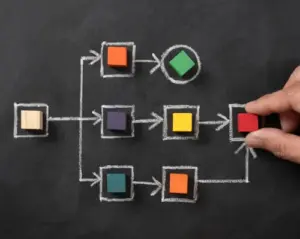
It started with a tip. Not from a friend or a pundit, but from the app itself. A glossy notification wrapped in false certainty. “High confidence pick, Barca to win. 91% predicted success rate.” The algorithm said so. The numbers were clean. The interface glowed. It even offered odds boosters if you acted within the next fifteen minutes. Temptation wrapped in data. Most nights, Sandile would have listened. But not that night.
He was sitting alone in the back of the shebeen in Tembisa, nursing a half-finished cider and watching the screen flicker through static. The Champions League was on, but the signal came and went with the wind. Barca looked distracted. Uncoordinated. He watched them press too high, chase the ball too lazily. Something in him said no. It wasn’t logic. It wasn’t math. It was something older. Something earned.
Sandile’s been betting for nearly seven years. Not as a career, not as an addiction, but as a language. A way to stay sharp. A rhythm that helps him feel in control in a world that rarely allows for that. He doesn’t chase big payouts. Doesn’t play parlays. He watches. Reads. Looks at body language, player travel schedules, weather reports in cities he’ll never visit. While the world talks about stats and AI-driven predictions, he still goes on gut. It’s made him lose more than he’d like. But it’s also what helped him catch the one thing that machine learning couldn’t.
That night, everyone was on Barca. The group chat was filled with confidence. “Boosted odds tonight, bet now.” “AI gave it 90%, this is easy money.” The app had reinforced it. Pushed it with slick banners and soft language. “Smart prediction. Expert backed. Bet with confidence.” But Sandile felt something else. He watched the coach pacing too much. Watched the captain stretch more than usual before kickoff. He placed R100 on a draw. Quietly. Without telling the group.
The match ended 1–1. Last-minute equaliser by the away side. Sandile didn’t celebrate. Didn’t brag. He just closed the app, finished his drink, and walked home in the dark. The streetlights were out again, but the path felt familiar.
 The next day, the betting app’s tone changed. “Unexpected result! Recalculate your edge with new AI insights.” The wording was clever, never admitting fault. Just adjusting. Sandile knew the game. He knew the algorithm wasn’t built to be right. It was built to keep you betting. To give you the illusion of clarity.
The next day, the betting app’s tone changed. “Unexpected result! Recalculate your edge with new AI insights.” The wording was clever, never admitting fault. Just adjusting. Sandile knew the game. He knew the algorithm wasn’t built to be right. It was built to keep you betting. To give you the illusion of clarity.
In the days that followed, he started noticing more. How often the “confidence” ratings lined up with high public betting volume. How rarely they were followed by actual results. He realised he wasn’t being informed, he was being nudged. Steered toward consensus. Herded into comfort. The illusion of certainty dressed in percentages and buzzwords.
He began to write them down. The predictions. The wins. The losses. Not just his own, but those pushed by the system. Week after week, the algorithm’s hit rate hovered in mediocrity. Fifty-five percent. Fifty-eight on a good week. Barely better than flipping a coin. But dressed up, it looked like wisdom. Machine-backed. Pattern-proven. Predictive analytics. A whole language built to replace your instinct with theirs. Sandile didn’t tell anyone. He knew they’d call him paranoid. “It’s just numbers, bro. Relax.” But he kept tracking. And over time, he stopped betting on the tips altogether. Not because he didn’t trust the sport. But because he’d seen the magician behind the curtain.
Sometimes, he still opens the app, just to see what it says. A 94% confidence on a market he knows is thin. A boosted odds tip on a player who’s nursing an injury. He scrolls through it like an old newspaper, aware, but unmoved. He doesn’t reject technology. He just doesn’t worship it. There’s a difference. He still bets. Smaller now. More sparingly. Not for escape, but for attention. To test what he knows against what the system doesn’t. Weather. Body language. Fatigue from travel. Ego. Human things. Things the algorithm can’t feel. And in that space, he finds the margin.
Last week, he watched a match with two kids from his block. They were new to betting. Still dazzled by the ads, the bright promises, the spinning wheels that made it all feel like luck was just one click away. They talked about the AI tips like gospel. “Bro, this app’s never wrong.” Sandile just smiled and said nothing.
The app sent another message later that night. “Top pick. 89% confidence. Back the favourite.” Sandile backed the underdog. It didn’t win. But it didn’t need to. What mattered was the choice. His choice. Made without illusion. Made without the borrowed mind of a machine designed to keep you chasing.
Because sometimes the algorithm lies. Not maliciously. Just by design. And sometimes, if you’re quiet enough, still enough, human enough, you’ll know the difference.







